#Especially with Aziraphale not letting Crowley speak
Text
Throwing my thoughts in the ring with the whole miscommunication topic, and I agree with many of the posts about how they’ve had to dance around each other so much and be careful about what they say for millennia that they don’t know how to communicate properly and openly because of it. That they’re bad at it because they’ve conditioned themselves to be careful and had to protect themselves and one another in this way.
Even now when they’re free, their first conversation at the start of this season in the present day is over the phone starts with Aziraphale saying to Crowley ‘Don’t say anything’ and so Crowley doesn’t. And then Aziraphale asks for confirmation ‘Are you there?’ To which Crowley does reply to reassure him ‘Shall I say something now?’ And Aziraphale replies ‘No’.
Showing that even though they’re free and not affiliated with heaven and hell anymore they’re still on alert in their conversations of being listened in on and that four years isn’t enough to break the cycle of not saying how you feel or really think in fear of being caught out.
#good omens#good omens spec#was editing and rewatched that scene#and like how the ‘exactly argument’ foreshadows the 2x06 one#I feel this one does too?#Especially with Aziraphale not letting Crowley speak#and then not fully comprehending what he says when he does#and vice versa#good omens 2#good omens meta
12 notes
·
View notes
Text
Jimbriel, Satan, the Book of Life, and what it means for Crowley
Acknowledging that what we know so far about the Book of Life from various characters is highly suspect, I'm going to posit to you that Beelzebub is actually the true authority on the Book of Life, and that they bookend Season 2 with very important (and hopefully accurate) information about the Book of Life. With that in mind, let's take Beezlebub's S2E1 description and see how it fits with other canon evidence:

But what does it mean to have never existed in the Good Omens universe? For that, let us look to Satan.
From in-show canon, we know that Adam was able to retroactively change Satan's status as his father to not his father:
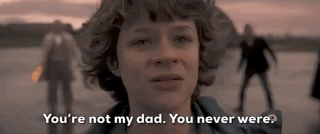
Adam altered reality, although Crowley, Aziraphale, the other celestials, and even Adam himself remember those events from a timeline that supposedly has been erased:

But Crowley nonetheless confirms that this is reality now. Satan was never Adam's father.
Additionally, though not technically in-show canon, we know from Notorious NRG that once Satan became Lucifer, this erased Lucifer from existence in the GO universe:
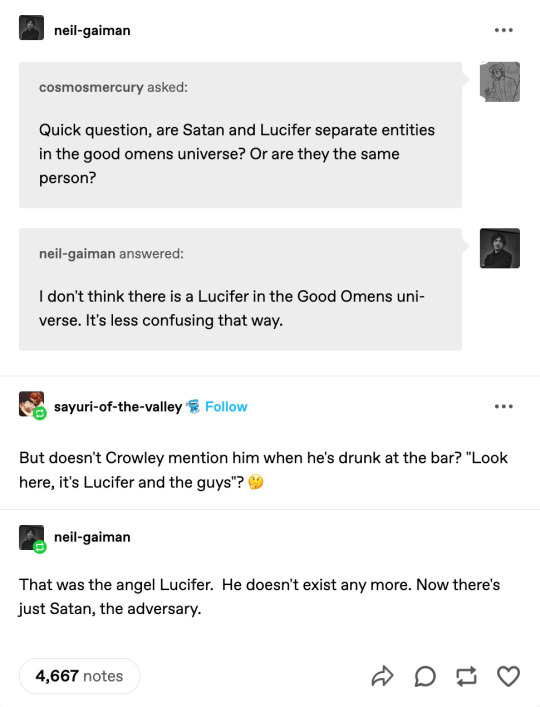
And Crowley's monologue in the bar drives it home; even though Lucifer no longer exists, Crowley still remembers him, and some key events that they were involved in together.
But a more dramatic portrayal of erasure is found in our favorite Good Omens himbo, Jimbo. In the trial of Gabriel, the Metatron makes direct allusion to the fact that Gabriel will no longer be Gabriel after his demotion:

Not "your memory of your time as the supreme archangel will be erased," no, it's:
Your memory of your time as Gabriel will be erased.
Whether he means to or not, Aziraphale reinforces this characterization of memory-loss-as-new-identity:
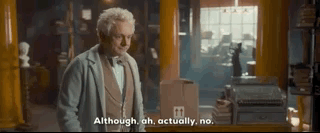
This can be taken simply as a safety measure, but Jimbo doesn't understand it that way and we see throughout the remainder of the season that Aziraphale is very consistent about calling his unexpected guest "Jim," even correcting Crowley when they're speaking privately and it wouldn't blow his cover to call him Gabriel:

But the final word on memory and identity, especially as they pertain to Jimbriel, again comes from our Lord of the Flies, Beelzebub:

All your you is your memories.
Altogether we see that there is significant in-show canon to support a theory that memory is inextricably linked with identity, and that when memory is removed, identity is so drastically changed that the name of the entity must also change... and the person who existed before, with that former name, exists no longer; it is as if they never had.
(But, as we see in the case of Gabriel, they can be restored.)
I told you in the title that this post was about the Book of Life: it is. Everything discussed here about memory and identity must necessarily characterize how the Book of Life operates, at least with respect to erasure. When someone is erased, they don't vanish, but they are so changed it is as if a new person has taken the place of the old, the way Jim took the place of Gabriel, until he got his memories back. But we can surmise that when someone is erased from the Book of Life, their memories aren't conveniently stored in a TARDIS/Ru Paul fly for later recovery. The memories may not be gone, but I'm going to guess that they would be extremely difficult (or impossible) to retrieve.
What this means for Crowley:

I think we need to give this scene a lot more credit for telling us how this universe works. Surface level, it reads as "you don't understand my trauma, and how I've been changed by it." Which is a very valid interpretation. But we can dig deeper and see that, given everything else we know about celestial beings losing their memories, names, and identities, Crowley is alluding to something far more horrific than just the scars left by flaming swords and halo-grenades.
These are the scars of a lobotomy. Something was taken from him, and he is aware of it.
He knows that his memory has been tampered with. Various people (Furfur, Saraqael) tell him that they recognize him, and of things they've done together. He has no recollection of them, but instead of getting agitated, he brushes it off and ignores it. This lack of questions from the guy who questions everything tells us that he already has the answers; not the memories, but the knowledge of why he doesn't have them.
Furthermore, when he's trying to get Jim to remember the something bad and Jim says it hurts, Crowley says:

I know. Do it anyway.
How does Crowley know that it hurts, to try to recall memories that have been taken out of your head?
Because he's been through it.
He has tried to remember, and some memories, like working on the Horsehead Nebula with Saraqael or monkeying around with Furfur, weren't worth the pain. Or perhaps it was pain on top of pain to remember what he had lost.
It is an especial testament to the cruelty of Heaven that he remembers going into battle, but not the bonds he formed with his friends. He remembers a million lightyear freestyle dive into a boiling pool of sulfur, but not the work he did on the Horsehead Nebula, a thing that brought him joy.
And now, the person he loves most in the world, his only refuge from the terror of his empty nightmares, from his malignant and creeping sense of unease that something is missing, has gone back to that place where his identity was so horribly violated that he lost his name.
How will our hero cope?
If you liked this meta, you will almost certainly like my meta on Continuity Errors.
For my thoughts on who Crowley may have been before the fall, go here.
For my thoughts on how this pertains to Metatron, go here.
As I continue to produce metas related to this theory, you'll be able to find them all here.
#good omens#good omens 2#book of life#good omens meta#aziraphale#crowley#gabriel#ineffable husbands#ineffable bureaucracy#beelzebub#ivoc#erasure theory
924 notes
·
View notes
Note
Hello mister Gaiman, I hope you're having a nice day
I've been debating for a while on wether or not I should send an ask and I've come to the conclusion that I might as well do it since the chances of getting an answer are pretty low
So I made my family watch good omens with me when I decided to watch it for the third time (I have a garbage perception of time but since we're in December I think we watched it a couple of months ago) and as we were talking I told my mum I could send an ask on tumblr and she immediately told me to send something on her behalf (clearly I'm late but let's not dwell on that)
So we watched it, I helped my mum with some of the vocabulary since she doesn't speak English as well as my brother and I, and came the end and my mum and brother cried
So from my mum : "tell him this is one of the best ending to a series I've ever seen"
Thank you from France, we loved it and will wait for season 3 impatiently while pretending to be patient
Also if I may add two questions that you don't need to answer :
Will we have more historical flashbacks in season 3 ? I absolutely adore the costuming, I think it's just so well done and so pretty and I just want to see more (I especially love the 1827 costumes, I'm on a quest to make both Crowley and Aziraphale's outfit for myself)
And while talking to my brother I mentioned the stuff that was cut and he mentioned doing a director's cut
So my second question would be, would there ever be a director's cut where some or everything that was cut would be added or would it change the story you've already told too much ?
Thank you for your time and have a nice day
Our cuts of Season 1 and 2 are the director's cut. He was very happy with them.
802 notes
·
View notes
Text
I've been seeing just about all moments of GO S2 being put under a microscope and absolutely dissected frame by frame
And still I am yet to see anyone mention a moment that might be small in the grand scheme of things, perhaps not as character defining as many other that have been (rightfully) analyzed a thousand times over, but which was *so* important to me, and every single time I watch it I'm just filled with so many feelings and jhaghagha
(putting this under a read more to not spam y'all with a ginormous post clogging your dashes)
The moment in question is this (my apologies for the pics, I currently don't have a proper way to take screenshots of S2 and had to snap photos of my tv screen lol)
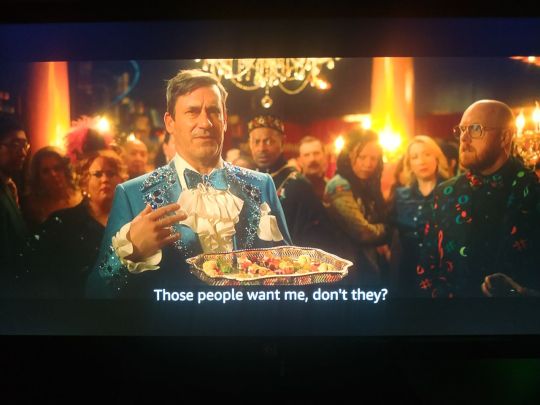
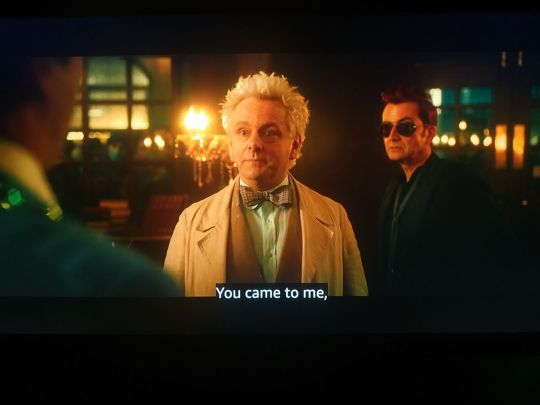
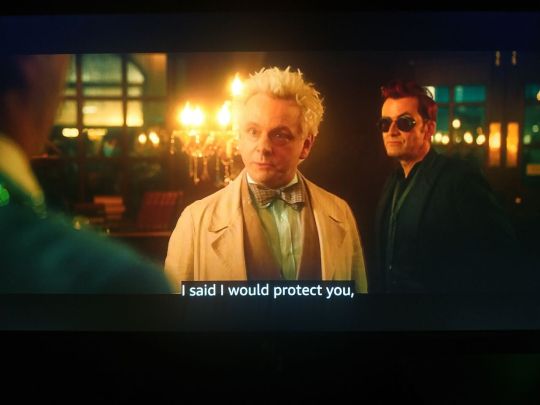
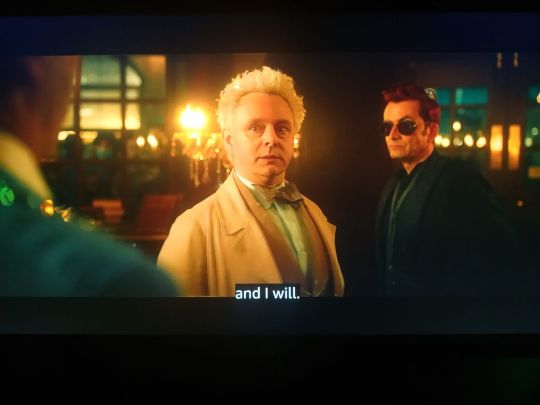
It's such a quick moment, a small blip in the entirety of episode 5, but let me tell you why it absolutely destroys my heart every single time.
First of all let's refresh our memory on Aziraphale's relationship with Heaven and Gabriel specifically, shall we?
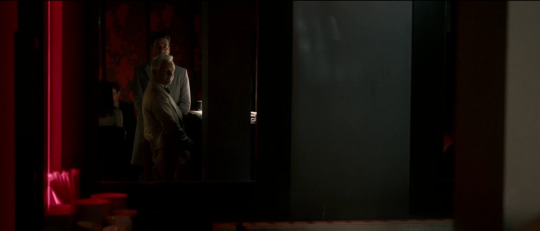
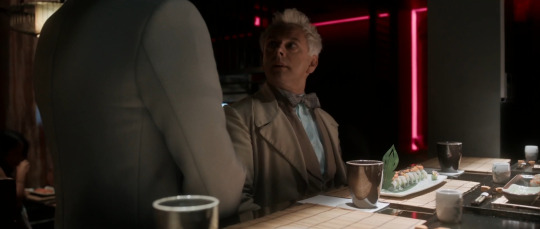
The very first time we see Gabriel in S1, he surprises Aziraphale at a sushi restaurant. Aziraphale looks to his left, because that's the side where Crowley usually appears when approaching him, but instead of his boyfriend the familiar Demon, he sees the reflection of Gabriel at his other side, and he turns around with what reads to me as very much an "oh shit" expression.
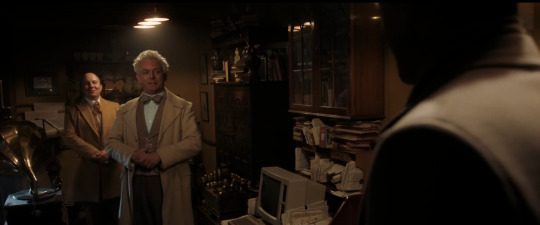
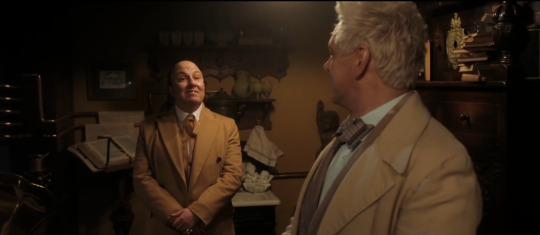
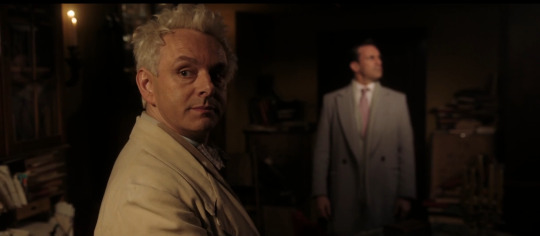
In episode 2 we see Gabriel again, along with Sandalphon; they are flanking Aziraphale and leaving him no way to escape in what to me seems a blatant intimidation tactic, especially with Gabriel being all "hey you remember Sandalphon, right :)" and Aziraphale being like "Oh yeah, likes smiting and turning people into salt, I sure do! *nervous laugh". There's literally no reason for them to be acting like this if not to (un)subtly remind Aziraphale what his place is, and that he is NOT safe, not even in his bookshop.

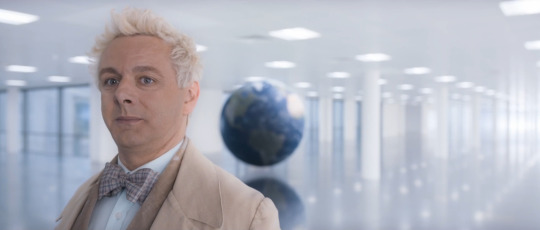
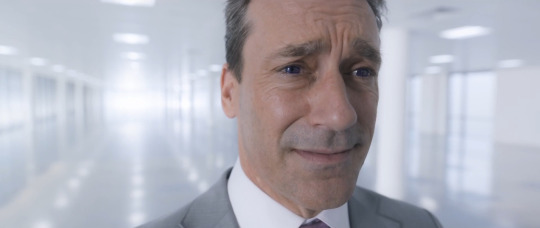
Whenever we see Aziraphale in Heaven he is constantly standing ramrod straight, hands kept caged behind him, none of his usual mannerism to be seen. He always smiles like a hare being stared at by a hawk and the cinematography very much underlines that tenseness by both showing the impossible, cold and sterile expanse of Heaven in contrast to the camera being shoved right in the characters' face to make the viewer feel just as uncomfortable as Aziraphale is.
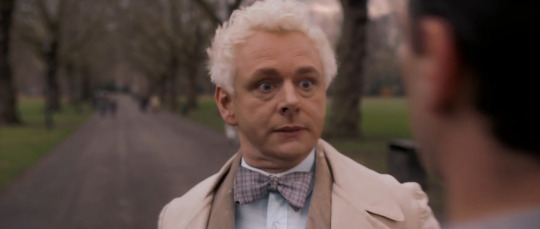
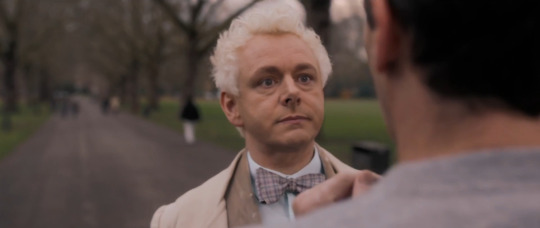
When Gabriel and Aziraphale speak in the park there's this moment after it looks like Gabriel is leaving, but he pops right back up in Aziraphale's space in an instant, causing the reaction we see in these screenshots. Aziraphale is clearly taken aback and tense, eyes widening which is like, fair considering Gabriel pretty much jump scared him, but that's rather the point, isn't it? Gabriel pretty much jump scared him. He didn't just turn around and jog back to Aziraphale to ask him about the sword, he purposefully moved himself up to him without any warning. Like sheesh, talk about terrifying bosses.
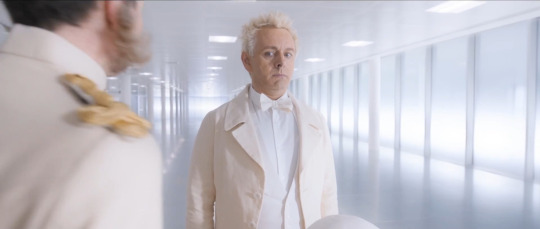
No Gabriel here, but just another example of how much Aziraphale does NOT like being in Heaven. When he gets discorporated and finally manages to stand up for himself, saying he refuses to fight a war, he still looks like *this*. Like he's one step away from just discorporating a second time and without an actual body out of sheer anxiety.
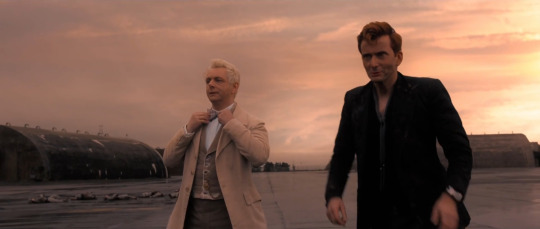
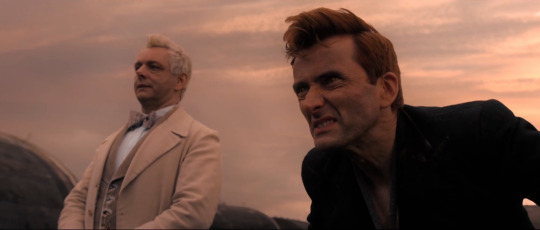
When all it's said and done at the Tadfield airbase and the four horsemen are gone, Gabriel and Beelzebub decide to go check what the heck is going on, at which point Aziraphale pretty much seems to be bracing himself, straightening his back, adjusting his clothes nervously and then holding his hand in front of him in a show of dignified quietness I definitely read as him doing his best to hide just how anxious he truly is.
Of course we don't see Aziraphale's reaction at being told to shut his stupid mouth and die already by Gabriel due to the body swap, and at this point is pretty safe to say Crowley has never shared with Aziraphale that little tidbit of information, but even not knowing the extent of the cruelty Gabriel showed toward him at the end, he still knows that Gabriel and, by extension, Heaven was more than willing and ready to murder him.
Even at the start of S2, when an amnesiac Gabriel arrives at the bookshop and then hugs him (awkwaaaard), Aziraphale looks like he's entirely frozen and unable to react to the improbability of what is happening, and when Gabriel asks him if he can go inside the bookshop Aziraphale's immediate reaction is to pretty much recoil with an immediate "No!".
Of course he is then forced to let him in because there's a naked man on his steps while the whole neighborhood is watching, and we get some many more little moments of Aziraphale anxiety emerging through his body language: The pacing, the way he sits ramrod straight in front of Gabriel, and him literally backing away multiple steps when Gabriel asks him "You know how it's like, when you don't know anything at all, and yet you're totally certain that everything will be better if you were just near one particular person?"
(Because of course Aziraphale knows how that feels, and that's exactly the same reason why he's been so scared of Heaven for-fucking-ever!)
(Also as an aside let me just bless Michael 'Acting Choices' Sheen for that smile that lasts a shard of a second after Gabriel asks that. You can pretty much see the word "CROWLEY" stamped in big bold letters on his forehead in that moment lmao)
(Also as an aside to the aside. Jon Hamm is just fantastic. Gabriel comes across as such an asshole in S1, but Amnesiac!Gabriel is a fucking cinnamon roll and he pulls it off so well ajahjahja)
Then of course we get the whole exchange about the 'something terrible' that sends Aziraphale into more anxious frenzy until another tiny, kinda overlooked moment hits us in the shins, in which Gabriel says "You're funny. I love you."
And like, can't blame anybody for not looking at that moment without much thought, I know that that sentence had me crying laughing multiple times on multiple rewatches, but also... God, you can see the way some of that fear instantly leaves Aziraphale, the way he relaxes ever so slightly and ??? Aziraphale??? Is that all you need to instantly start trusting someone who wanted you dead? Who treated you like shit for who knows how long?
(Why am I even asking this, of course that'd be enough, it's Aziraphale we're talking about, here.)
Then of course the rest of season 2, he and Crowley having a row about what to do with Gabriel with Aziraphale insisting that he needs them, as his friends, yada yada, we get back to the initial moment that sparked this post.
We get there, Aziraphale's (eldritch) Ball and the romantic moment he's been working himself up for ruined, murderous Demons at his steps putting both he and all the humans inside in peril, and all he would need to do to avoid any harm coming to them is to give Gabriel up, and...
"You came to me. I said I would protect you. And I will."
Not just the words, but the way Aziraphale says them; voice lowered and serious, that hint of hesitation and fear at the start that melts away into full blown confidence at the 'And I will'.
It isn't just Aziraphale being scared by Gabriel mentioning the 'something terrible' at the beginning, nor the brief moments of cryptic recollection that he witnesses Gabriel going through-- It's that Aziraphale sincerely accepted to protect him, and he wasn't going to give that up. He is a Guardian and a Principality, after all.
And like, I see this and how am I supposed not to get my heart utterly shattered by it? If Aziraphale had rejected Gabriel, or treated him unkindly in any way, I hardly doubt anybody would be hard pressed to say Aziraphale did not have the right to do so, not after the way he's been treated by Gabriel and Heaven his whole life. But he doesn't. He is kind to him, if a tad long-suffering at times. The protection he extended over Gabriel is utterly sincere and unwavering.
And ngggggggh I don't even know where I'm going with this. I just. Love Aziraphale so much. Stupid, clever, anxious, brave man-shaped thing that he is, recklessly throwing himself into the line of fire for somebody that, by any means, did not have any right to ask something of that magnitude from him. He is my scrungly, and by God am I ever so excited to see how everything will play out in season 3. I want him to fully grasp that bravery and raise absolute -metaphorical- hell with it. Shine bright, you crazy bastard.
#good omens#aziraphale#meta#i suppose#idk i just wanted to throw my two cents and talk about this specific moment#cuz it gives me ALL of the feels#my angel blorbo ilu
968 notes
·
View notes
Text
I've been stuck on viewing Maggie as Crowley's mirror, and for most of the show I like that interpretation. But once I started thinking of Nina as Crowley's Mirror in the ball scene specifically, I made a connection....
Aziraphale is playing God here. He has a vision- a happy romantic evening where people speak Victorian English, dress nicely, dance, and fall in love -and he wills everyone present to conform to his plan. But Nina doesn't conform. Nina feels like something isn't right. She asks questions.
She asks Aziraphale what's going on, why she doesn't feel sad when she knows she's sad, and Aziraphale doesn't give her a satisfactory answer. He tells her that the important thing is that she's here. She's here to play a role in his great plan. To dance in his ball.
So she expresses her concerns to Maggie. Maggie hadn't seen the issues at first, but she listens to Nina, and Nina gets her to acknowledge the absurdity of the situation just a little bit. Listen to their conversation at the dance again. It sounds SO MUCH like the conversations we've heard Crowley and Aziraphale have a thousand times during their 6000 year dance. Crowley calling out heaven, asking questions, trying to get Aziraphale to consider the absurdity of it all. Aziraphale mostly defending heaven, but listening, and sometimes acquiescing.
And this all falls in line with a point I've made before - In season 2, Crowley's relationship with Aziraphale begins to mirror his relationship with heaven. Aziraphale shows a pattern of not listening to Crowley the whole season, but especially in this scene. Crowley tries to ask him what is going on, and alert him to very real danger, but Aziraphale is dismissive. He is blinded by his desire to see his plan to fruition.
And just so we're clear, this is not an Aziraphale hate post. Rather, I think it might give us some insight into where God is coming from. Because Aziraphale's actions may be dismissive and controlling, but they are motivated by love. Misguided, certainly, but with all the best intentions. I have a feeling, when we finally meet God, it will be a similar story. And maybe both She and Aziraphale will learn that sometimes to love means to let go.
#keeping this post short because if I think about it too much I'm going to make myself sick#like how Maggie and Nina's conversation happens while dancing#and aziraphale and crowley have been having that same conversation and doing the same dance for 6000 years#it's so romantic and heartbreaking and poetic I think I might actually die#Also... think about how Lindsey broke up with Nina right before this scene#kind of like how heaven broke up with Crowley before the earth began fuck fuck fuk#and then Crowley yells at Nina to trust someone for once in her life like...#he knows nothing about her he's projecting SO HARD#good omens#good omens 2#good omens season 2#gos2#good omens meta#ineffable husbands#aziraphale#aziraphale x crowley#crowley#crowley x arizaphale#aziracrow#neil gaiman#go2#maggie and nina#reposting slightly edited because I made a mistake the first time#thank you @tip-top-tickety-boo for pointing it out!
641 notes
·
View notes
Text
Good Omens Season 2: Some Thoughts (and also Screaming)
First, /screams
Second, obligatory disclaimer that this meta contains MAJOR SPOILERS for all six episodes. If you somehow have managed to remain virginally unspoiled, look away now, scroll past, or add "good omens s2" and "good omens spoilers" to your block list, as those are the tags I have been using for all posts and reblogs.
Third, /screams more
Okay okay okay. Deep breaths.
Anyway, so, uh, how about all that, huh? First, the good thing about the tone of the season overall was that it felt considerably darker and more adult, in a good way. We didn't have the precocious kiddies, the kitsch and literally-comphet Anathema and Newt, the so-clever narration, etc. All that was gone, which makes sense when you consider that a) the end of last season saw them reboot into an entirely new universe, and b) the fact that God has gone silent is, in fact, a major plot point for the season. We don't have Her slyly telling us the story, or indeed anything, and everyone is left to make their own judgments and take their own actions. Which, obviously, gets them into a lot of trouble, especially when Metatron (the Voice of God, aka someone acting in the belief that they're speaking for God and therefore doing terrible harm) swoops in with the ultimate buzzkill at the end of episode 6. But we'll get to that.
The downside was that the main, present-day plot (hiding Gabriel in the bookshop and trying to get Nina and Maggie to fall in love) was fairly thin, felt stretched out and at times weirdly paced, and otherwise existed mostly to get us to That Ending and the setup for season 3. But the ending was so damn good (if obviously, very painful) that I can't be TOO mad, not least because we spent six episodes with them just making absolutely no pretense about the whole thing being as incredibly homosexual as possible. I'll be honest: I did not think they were going to actually, explicitly go there. Neil Gaiman has been so consistent about "your interpretations are valid and you're welcome to read it however you want, but the only canon is what's on screen," which I think is frankly a good thing (not least since the Neil GAYman Cinematic Universe is consistently very, very good to us queers), that I just... didn't quite think they'd pull the trigger. Sir Terry is dead and can't have active input, this is based on a book published 30 years ago, maybe they didn't want to make it LIKE THAT... etc. I certainly hoped, but I didn't really think they would.
Uh. Well.
As I said in my various semi-coherent liveblog posts, I honestly don't think there was a single straight person in the entire season, among both major and background characters. Aziraphale/Crowley and Maggie/Nina are the obvious paralleling couples, but Beelzebub (using "they" pronouns and addressed as "Lord" despite presenting as femme/femme-adjacent) is clearly nonbinary and therefore also queer, and the countless gay/queer side characters were just /chefs kiss. From Job's son making a sassy pass at Aziraphale, to the random Scottish goon with Grindr on his phone (which he then gives to Aziraphale, because what is subtlety), to the interracial couple with the trans spouse at the Pride and Prejudice ball, there was just a lot of casual, unremarked, non-story-critical queer representation visible at every turn. It's like the NGCU saw the bigots wailing about Sandman season 1 being extremely gay and went CHALLENGE ACCEPTED, LET'S MAKE GOOD OMENS 2 EVEN MORE GAY.
God bless.
Obviously, Jon Hamm as Amnesia!Gabriel stole the show (he was SO fucking funny) and it was also incredibly fun to watch Miranda Richardson repurposed as a scheming demon. Nina Sosanya also reappeared as Nina the coffee shop owner, which leads us into the Maggie-and-Nina subplot. They're obviously, wildly, incredibly clearly an analogue for Aziraphale and Crowley themselves, but they're also each, crucially, a mix of both. On the surface, Maggie is Aziraphale: the plump, blonde, earnest, sweet-natured one owning a slightly dated book music shop and somewhat clueless about emotional nuances, while Nina is (also on the surface) Crowley, the hard-edged dark loner who doesn't want to open herself up to people or be spotted caring. But emotionally, Maggie is Crowley: the one openly pining, clearly besotted, only wanting to hang around their crush and do whatever they can to make themselves useful, while Nina is Aziraphale. Interested but reticent, attracted but conflicted, trapped in an abusive relationship with a demanding offscreen "lover" (Lindsay/Heaven) who tries to constantly control and shame them without ever offering much, if anything in return. By the end, they bring themselves around to what Maggie/Crowley are offering, but by then, well. We've got a lot more problems on our hands.
As I also said in my earlier posts, this entire thing has always been a metaphor for religion, queerness, and what religion -- especially abusive, fundamentalist, organized religion -- does to queer people, but they really cranked the FUCK out of that metaphor this season. Aziraphale is guilt-tripped, controlled, and shamed for his attraction to Crowley at every turn. He is torn between his imagined duty to Heaven, in all its ignorant, uncaring, bureaucratic, gratuitously cruel system that he still insists on seeing the best in because he can't bear the alternative, and the chaotic and sometimes grey but genuinely more good morality that Crowley offers him. (Can I just say, we were explicitly shown that the two of them together doing "just a little miracle" are more powerful than Heaven AND Hell combined.) And at the end, he's told that the only way he can be with Crowley -- what Metatron explicitly blackmails him with -- is if they both go back to heaven, submit themselves to the cruel system again and give up everything that has made them who they are: their home in London, their human friends, their reliance on each other, their independence, their own ways of doing things. You can be queer in this (religious) framework, but only the limited, watered-down, controlled, controllable, constantly-under-supervision kind of queer, which relies on both you and your lover "converting" back to the true faith. And if you don't cooperate, they will literally kidnap you, lie to you, manipulate you, take you from your soulmate, and force you right back into doing the one thing (destroying the world) that you never, ever wanted to do in the first place, because in their minds, that is still better than this. It's for your own good.
Ouch.
And the thing is: that's why the ending a) hits so hard and b) is so fucking painful, because of course Aziraphale agrees. He has no conception of being able to defy Heaven on his own; he has always, always needed Crowley for that. In the flashbacks, when Aziraphale is faced with an order from Heaven that he desperately does not want to carry out (such as letting all Job's children get killed), he still relies completely on Crowley to "outsmart the rules" and find a better way. Crowley is A Crafty Demon; that's what he does, and so Aziraphale rationalizes it to himself that therefore that must be fine. Even in season 1, when he really didn't want the Apocalypse to happen but initially thought it was his duty as a good Heaven footsoldier, he relied on Crowley to talk him out of it and allow him to do what he really wants instead. That's their whole dynamic in a nutshell, as exemplified in that scene in episode 2, where Crowley tempts Aziraphale with the "pleasures of the flesh" while sprawled on his back in Ravish Me mode like the giant walking gay disaster that he is. (Sorry, buddy. That beard. Can't do it.) Everything that Aziraphale's existence is, that makes him who he is, that he loves and cherishes the most (in this case, food and wine) comes from Crowley. Everything else is just background noise.
Throughout the season, what we see is Aziraphale increasingly coming around to the fantasy of being with Crowley. He's coy and flirty; he talks about "our car" and expects Crowley will let him (which he does); he wants to have a Jane Austen ball and for them to dance together (oh my heart); he even thinks, at the crucial moment, that the best way for them to be together is to go back to heaven just like they were in the beginning, once more perfect angels, as if those entire six thousand years of struggle and grief and pining and separation and falling didn't happen. And Crowley -- poor, poor, brave, devoted, heartbroken Crowley -- has just heard for the first time in said six thousand years that actually telling the person you love how you feel is an option. Maggie and Nina tell them point-blank that their whole stupid plan failed because people aren't chess pieces who can be moved and automatically achieve the desired result. And of course this gobsmacks the dearest and dumbest Ineffable Husbands, because they can't conceive of anything else. People are chess pieces in the Great War of Heaven and Hell; Aziraphale and Crowley themselves are chess pieces who have been desperately trying to get out of being moved by external forces, but that doesn't change the fact that that's what they are. They don't have volition or agency aside from that which they can sneak for themselves in brief and stolen moments. That's it.
Until, well. It's not it. They discover that this whole would-be war is actually an elaborate ruse to cover up another angel-demon romance, that of Gabriel and Beelzebub. (I'll be honest, I'm 99% sure they did this storyline because they saw the fans crackshipping them, but I appreciate a fictional narrative that values and incorporates its fans' input, rather than trying to constantly "trick" or "outsmart" them or "do what they don't expect.") And Gabriel and Beelzebub get to be together, but only by leaving their world forever. They have to desert their homes, their structures, even their own identities, and never return. And Crowley and Aziraphale are so rooted in their "precious, perfect, fragile" life in their little corner of Soho, with their bookshop and their Bentley and their dining at the Ritz (which they didn't get to do in the end because METATRON /shakes fist), that that just doesn't work. Neither of them can conceive of doing that. So Aziraphale thinks "go back to heaven and try to make the terrible system do some good and take what we can in terms of being together" and Crowley just... pours out his heart. He's ready to fucking propose. He barely stops himself from saying something to the effect of "I want to spend eternity with you." He begs, he pleads with Aziraphale to go away not in the literal sense, but the emotional/metaphysical: to finally break this toxic dependence on Heaven and tell them once and for all where to stick it. And because he is desperate to make Aziraphale understand, he finally throws all caution to the winds and recklessly, desperately, adoringly kisses him, the one thing he's wanted to do for ages and...
Gets. Shot. Down.
Ugghhhhh. I'm suffering all over again. Aziraphale wants him, hungers for it, for them, and yet he's been so abused and so conditioned by Heaven (he's still blithely repeating to Crowley's face that "Hell are the bad guys!") that he just cannot accept that kind of desperate, blind, limitless, lawless affection. He even forgives Crowley for this "transgression," just to really twist the knife, and Crowley just can't take it, can't face up to how terribly this has all gone up in flames, after he went to heaven trying to find the answer for Gabriel's situation. Gabriel, who he fucking hates. Gabriel, who tried to kill the angelic being he loves (and for which Crowley has transparently never forgiven him). And yet at one pouty puppy-eyed look from Aziraphale and a warning that whoever is harboring Gabriel might be in danger, Crowley leaps headlong into the Bentley again and rushes to the rescue while "Good Old Fashioned Lover Boy" is blaring. He stoutly protects Gabriel; he does a miracle to disguise him; he lets him have hot chocolate and stay in the bookshop; he guards him from the literal demonic horde outside. All because of Aziraphale. That's it. And then, it still doesn't work. Not only that, Gabriel's absence and decision to forego Armageddon gives Heaven the one tool they finally need to take Aziraphale away from him.
I repeat: Ugghhhhhhhh.
(In a good way. Ngl, I love this angst. This is the kind of angst my brain Thrives on, the Thematic Parallel Romantic Character Arc kind. Nom nom nom. But also: AGONY.)
I also need to talk about Aziraphale driving the Bentley, aside from the obvious metaphor of him being in Crowley's home while Crowley is in his. Last season, we had the "you go too fast for me, Crowley" scene with them sitting in said Bentley, which was Aziraphale saying he's not ready for a relationship. In this season, as noted above, we see Aziraphale increasingly embracing the potential fantasy of being with Crowley. But here's the catch: when he's in the Bentley this time, driving it, setting the pace, acclimating to the idea, he's driving his own idea of what the Bentley/his relationship with Crowley is. It's not the real thing. He plays classical music; he supplies himself sweets; he turns it yellow; he drives too slow. Crowley calls him in another old-married-couple snitfit to complain that Aziraphale's messed it up, but what Aziraphale has actually messed up (or will, by the end of the season) is far more consequential than just a car. He's changed the entire shape of their relationship to the one he thinks can make it work, and it just doesn't. It has to be them -- "we could have been... Us" -- or it's not even close to the truth. It's not worth their time.
I repeat: Ouch.
Speaking of the writers validating fan theories, I know we all picked up and screamed about on Crowley's idea of Peak Romance Guaranteed To Fall In Love being sheltering from rain and gazing into each other's eyes, which confirms that that poor bastard was indeed ass-over-teakettle gone as soon as he met Aziraphale (again) in Eden. I also need to talk about the 1941 redux, because wow. This time, the danger comes from Hell, which we see being its usual self: gleefully, pointlessly cruel, pettily backbiting, dirty, sniping, tedious, endless, determined to mindlessly destroy because They're The Bad Guys and they like it. So they blackmail, spy on, miracle-block, illicitly photograph, and try to prove that Aziraphale and Crowley are secretly a couple, right after Aziraphale himself has just had the Light From Heaven realization that he's in love (which we all also picked up on in s1). They're forcibly outing them (to speak of more Religious Queer Trauma) in order to break them up/get them into trouble with their authorities/families. Aziraphale and Crowley manage to escape it mostly by dumb luck, but Crowley having an altogether freakout, hands shaking, barely able to actually point the gun at Aziraphale even in the knowledge that it's supposed to be fake, is just... wow. He can't even fathom the idea of ever trying to destroy him in earnest, especially when he knows on some level that Aziraphale also finally just realized his own feelings. So I just need to --
/screams
Anyway, Aziraphale's entire arc this season is doing what he thinks is the right thing and then inadvertently causing harm and damage as a result. In the Edinburgh flashbacks (live slug reaction of me: SEAN BIGGERSTAFF???!!) he tries to stop Elspeth from stealing bodies and gets Morag killed and Crowley drinking the laudanum to save him (though that part with David Tennant just riffing left and right, using his natural Scottish accent, and being Tiny Crowley/Huge Crowley was hilarious). He invites his neighbors to a Pride and Prejudice ball and makes them all the target for demonic attack. And of course the Job episode: Aziraphale, horrified at Heaven's callous cruelty, desperate not to get Job's children killed, willing to go along with Crowley's tricks to save them somehow, tempted by Crowley to do the fucknasty with their angel bits eat some food and decide that he likes it. As mentioned, the whole thing about God being silent this season is a major thematic choice. The only time we see/hear God is Her communing with Job from afar. Aziraphale enviously imagines the answers he must be getting (he's not, he's baffled and perplexed), while Crowley longs beyond words to even have the opportunity to ask the question: why? Why do this? Why is this your plan?
And of course, this absence culminates in the Metatron, the Voice of God, the person arrogantly claiming that they're speaking for God and know exactly what Heaven wants, being able to seize Aziraphale by the short hairs and absolutely fuck him over. Gabriel is gone/decommissioned/eloping with Beelzebub, so Heaven needs a Supreme Leader (God apparently is no longer a factor in the equation). And what this Supreme Leader needs to do is finally unleash the Apocalypse that Gabriel decided to pass on (the Second Coming). Aziraphale needs to be punished, taken away from Crowley's influence/love, and put back under Heaven's explicit control, so Metatron spots a great opportunity to do all three at once. It's not an accident that the exact tool he uses to get Aziraphale to agree is "now you can actually be with Crowley!" Aziraphale and Crowley have been trying so hard to hide out from their respective Head Offices, but now all at once, there's this seemingly miraculous opportunity for them not to have to do that anymore! They can be together! They can be sanctioned by Heaven! They can give up all this hiding and sneaking around and lying! Isn't that better?
... As long as, of course, they give up absolutely everything that makes them who they are. No big deal. Minor catch. Probably nothing.
Metatron doesn't let Aziraphale have time to escape, or think it over, or reflect, or anything. He pressures Aziraphale to come with him immediately, or be once more subject to Heaven's implicit wrath/destruction/judgment. Believe me, Aziraphale already KNOWS he's made a huge mistake, as soon as he hears what Metatron really wants: bringing him back to unleash the Apocalypse that Aziraphale and Crowley have given up literally everything to prevent. He doesn't need time to reflect. By the time my man is in that elevator, he's well aware of what a catastrophic misjudgment he's made, and yet --
Aziraphale needs this. He has, as noted, literally always relied on Crowley outsmarting Heaven's cruel orders in order to prevent himself from having to do them. He's relied on Crowley rescuing him ("rescuing me makes him so happy," WELL BUB, IT'S BECAUSE YOU ALWAYS NEED IT). He admits to Crowley's face that "I need you!" He hates Heaven's sadistic meanness, but he has absolutely no framework, in and of himself, to defy it. When the rubber hits the road, he will crumple and try to go along with it, and now he's been put in a position where he's going to have to stand up, defy Heaven, and make the break once and for all BY HIMSELF. He doesn't have Crowley around to do it for him, he has no support, he is going to arrive in Heaven and be shuttled straight off to the Apocalypse 2.0 War Room. The only way he gets out of this is if he actively stands up, if he chooses himself and Crowley and their life, and he has to.
The thing is:
Aziraphale has lived his entire eternal existence Looking Up. Up is the direction of Goodness and Heaven. Up is where Angels go. Up is where Aziraphale comes from and where Demons and Hell are not. But now he's going Up, in a position to take over the whole shebang, and it's the last thing he wants.
So he's going to have to come back Down.
He's going to have to Fall. He's going to have to get back Below at all costs. He's going to have to finally, once and for all, understand what led Crowley to make the choice to leave Heaven and never come back. It's only then that they can possibly be together on any kind of conscious, equal, deliberate footing, claim their own agency, reject Heaven AND Hell, and try to really earn that South Downs cottage and that happy-ever-after, and it's gonna hurt so good.
Now if you will excuse me, /screams
#good omens#good omens meta#good omens s2#good omens spoilers#ineffable husbands#look this probably could have been twice as long#but i had to stop somewhere#I JUST HAVE A LOT OF FEELINGS
905 notes
·
View notes
Text
This thought struck me while I was driving and I don't know if it's a) tenuous at best, b) me finding meaning where there is none or c) possibly a thing. So naturally I'm going to throw it out there as a possible maybe-theory/foreshadowing.
As we all know, this handshake moment in the magic shop in s2 has the sword very deliberately positioned right where Aziraphale and Crowley's hands meet and we see the three swords in Aziraphale's back as he moves forward.

And when Aziraphale walks back to the counter and Crowley turns to watch, we see three swords now towards Crowley's chest - it's nicely and clearly pointed out with pictures in this post by @newfangledfancy
As many have noted, if Good Omens is anything, it is deliberate in its choices, especially when we're looking at something as obvious as this. What exactly it means, we'll no doubt find out later, but it certainly seems somewhat ominous and foreshadowing, with the sword down the middle arguably already in play with the separation of Crowley and Aziraphale at the end of s2.
My take? The sword in the middle is the breaking our two faves apart, the swords in Aziraphale's back are an indication of betrayal by Heaven (he still trusts they are the 'good guys') and the swords to the front of Crowley, to me, is indicative that part of that betrayal will involve trying to harm/destroy/get rid of Crowley.
The 'offer' to reinstate Crowley to angel status was such utter piffle (sorry, couldn't help it) because the Metatron knew he'd never go for it, but it also served another purpose; to lead Aziraphale to think he'd misjudged the Metatron (even if Aziraphale didn't really think that and doesn't have a choice about returning to Heaven, I do think part of him still also believes the system can be changed from within).
That extremely pointed, horrible look that the Metatron shoots Crowley just before he and Aziraphale leave the bookshop to go discuss the promotion (with accompanying danger music and all), you know, this one:
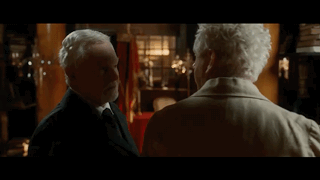
reveals to us that this performance the Metatron is putting on for Aziraphale really is just that, a performance. He wants Aziraphale to think he's misjudged him, I'm sure he was hoping he could convince Aziraphale to trust him. I think the angel is too clever to fully trust the Metatron, but what it does do is maintain Aziraphale's trust in Heaven and, I believe, the possibility he could make a difference.
So why the offer that Crowley could come to Heaven too? Yes, to entice Aziraphale but also, the offer makes it seem as though the Metatron has no gripe with the demon after all. It may be 'irregular', but he was willing to let Crowley be reinstated, it puts any notion of the Metatron potentially wanting to hurt Crowley off Aziraphale's radar (at least for now).
It's interesting too, in the 1941 magic shop scene, that the swords appear to be going into Crowley only once Aziraphale has moved past him, has his back to him. If I was following the separate, betray, destroy sequence of the sword set up, then I'd take that to suggest that any move against Crowley will happen while Aziraphale has his back turned, so to speak, and can you imagine the kind of fury that would unleash in our no. 1 angel? Coz I can and it is amazing! But I digress...
While speculation is fun (so, so much fun) and all, the point, the POINT of this rambling post was to say that if indeed that 1941 magic shop sequence is foreshadowing Aziraphale being 'stabbed in the back' and Crowley attacked in some way, it's not the first time we've seen a potential nod to that.
Look it may be entirely coincidental but I have to say, there is mighty similar symbolism right back in s1 when Aziraphale and Crowley are hit with the paintballs. Where does the pellet land on Aziraphale? On his back (and how, from where he's standing? Is there someone behind him??). And where does Crowley cop the 'bullet'? Right there in the chest.
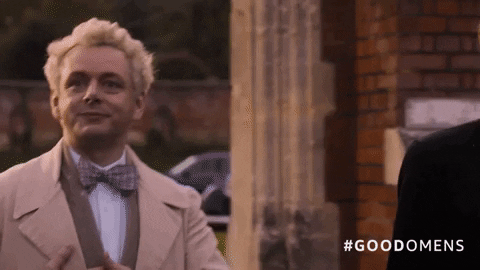
I just wouldn't put it past this show to have planted the seed that early on. And look, if it's nothing of the sort, then they're just fantastic stand alone sequences. That's the greatest thing about Good Omens, if it was a Clue, then it's amazing and if it's not, it was still amazing. We simply cannot lose.
293 notes
·
View notes
Text
Canapes. A Good Omens Sex Meta Thing.
A little short burst of meta about wordplay, shelter, smooches and tiny dinners.
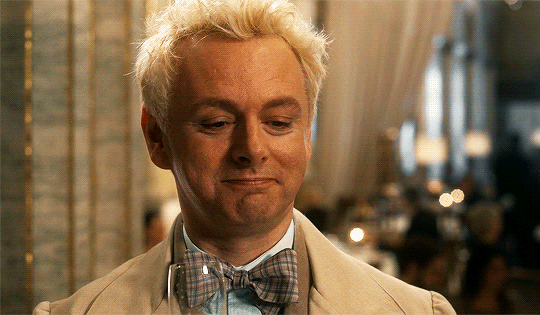
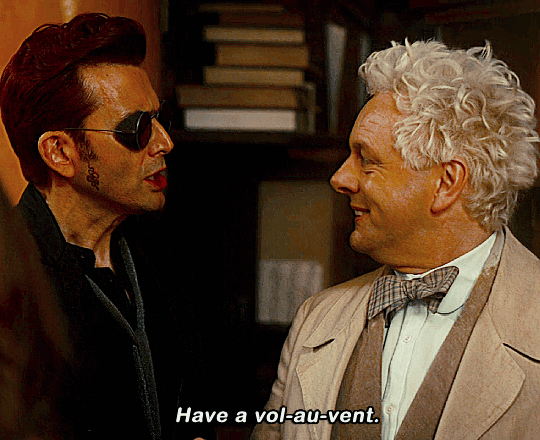
This is inspired by @noneorother, who correctly pointed out that I should have included in the (Non-Frozen) Peas meta more about the rest of the wordplay happening in Aziraphale's line of French to Crowley. So, let's talk about that other French word that is hidden in in plain sight (well, sound) in Aziraphale's sentence and how it's a bit, well... vavoom-y.
In this meta, we're mainly going to look a little bit at their love of messing about with homophones. For those who haven't been in a language class in a minute or for whom languages are not your thing--don't worry, I have you covered. :) Homophones are two (or, occasionally, more) words that sound exactly the same when you pronounce them but which have different spellings and different meanings. An Ineffable Husbands-y example in English would be "pair" and "pear." One word means two people or objects grouped together and the other refers to a kind of fruit but when you speak, the words sound identical.
When you are reading, you can easily tell which word is meant by how it is spelled but if you are just listening to a person speaking, you would need to rely on the context clues provided by the other words in the person's sentence to figure out which version of "pair"/"pear" the person was using. The context becomes key to understanding the meaning-- which we also know of to be true in general with Ineffable Husbands Speak, right?
The last word in Aziraphale's sentence in French to Crowley in S2 is a homophone in French, which is absolutely the point of what Aziraphale was going for, in that it's a way to say both words at once.
Because of Crowley translating the French back to Aziraphale with the whole "you don't have an aunt, she doesn't have a gardener, and he doesn't have a... pen", we assume that what Aziraphale said was this: "Oui est la plume de la jardiniere de ma tante?", which we would then translate on one level as meaning "where is the pen of my aunt's gardener?" As we looked at in the first meta I wrote about this line, while this is one way to translate this sentence, Aziraphale built the sentence as a riff on "la plume de ma tante", a French phrase that is used to describe sentences taught while learning a new language that you would never actually say in real life-- which is the context that Crowley used in translating it back, even if as he heard the innuendo, as he knows of the cliche and also no one is ever going to ask where the pen of their aunt's gardener is. Ever lol. We talked in that other meta about how the sentence can also translate where "plume", which means feather in one of its meanings in French, and "jardiniere", which was appropriated to English from French to mean a garden box/flower box, can both be sexually euphemistic-- especially as "la jardiniere" also has meaning with regards to French cooking and food. The key bit to this meta here, though, and to the homophones is the last part of the sentence-- "ma tante"-- and what else it sounds like in French.
We talked about how "la tante" can mean aunt, as Crowley replied, but that it can also mean "queen" and, when taken with the other words in the sentence being euphemistic in a feminine way, the sentence as a whole can be taken as Aziraphale requesting some overdue quality time with Lady Crowley, whom he referred to as "my queen" in French. All of this still holds but what will add to it is that a homophone for "la tante"/"ma tante" in French is "la tente"/"ma tente". Even though these two words are spelled differently, they are pronounced exactly the same way... but "la tente" does not mean "aunt" or "queen"... it means "tent."
So, there's a homophone in French that Aziraphale uses when speaking with Crowley in S2 that translates his word as both "my queen" and "my tent" at the same time because the words are pronounced the same way. This, in true Ineffable Husbands form, manages to be both pretty amusingly dirty and pretty romantic at once. This homophone is very, very clever on Aziraphale's part because while the sentence is referring to Crowley in a feminine way and is Aziraphale expressing that it's been too long since he had himself some red velvet, the homophony causes the other word in play at the same time as "queen" to be "tent", which also euphemistic for an erection. So we have two different words that look almost alike and sound exactly the same when spoken and Aziraphale said one word-- made one sound-- and it represented two words at once, at the same time; one that corresponded to a more feminine-leaning concept of gender (and is also just a French word for queer) and the other that corresponded to a more masculine-leaning concept. But they sound the same and it's all one sound and you can't really tell the difference between the words. How perfectly Crowley. :)
But, as you all know, a tent also is...
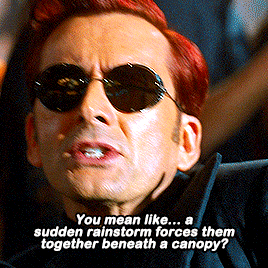
...a kind of canopy.
The French word for "canopy", if you're referring to a covering of land, like a tree canopy, is "canopee" and Aziraphale actually speaks French well and would know that but it wouldn't fit the sentence full of innuendo he was building. The sentence builds to the homophone.
As a result, even though Crowley translated what Aziraphale said as "ma tante"-- which isn't incorrect-- and he pretended it meant "my aunt" when he knew it meant "my queen", he also heard the homophone in there that brought forth in the hidden word in the sentence-- "ma tente"-- so he also heard "my tent"/"my shelter" in there and because Crowley plays with homophones and similar word-related things (paronyms, etc.) in Ineffable Husbands Speak just as much as Aziraphale does, he heard what Aziraphale was doing and so really made the jump then hearing Aziraphale use homophones and so mean both two different words that sound alike and say both "my queen" and "my tent" at the same time.
So, they're burying canopies all over the place in S2. Crowley's canopy dialogue in pub scene is him recounting his and Aziraphale's first kiss and Aziraphale flirtily references it back to him in French later on. We aren't quite done yet, though. Recall that I said above that the French word for "canopy" is "canopee." It's pronounced "kan-oh-PAY" and, just like with "la tante"/"la tente", it has a word that is awfully close to it in French and that would be one we also use in English-- "canape."
Canapes are appetizers or, as Gabriel charmingly called them, "tiny dinners." They can be satisfying all on their own or as a starter before a main course. A vol-au-vent is a type of canape. While no one uses the word "canape" during The Meeting Ball, that is what they are all eating. It's there implicit in the words that are actually being said, like how "ma tente" might translate literally as "my tent" but has the context of "canopy" to Crowley and Aziraphale. Crowley's word for what was covering them when they took shelter from the rain and first kissed is a "canopy" and it likely was a literal one, in the sense that it was probably a covering of trees and the word for "canopy" in French sounds just like a kind of food.
So, a "canopy" in French is a "canopee", pronounced virtually identically to "canape", which is an appetizer of a small bite of sometimes-toasted bread or a cracker topped with with any number of creative food options to make a delicious, tiny, delightful dinner in its own right or a preview of the food to come.
A canape (in Ineffable Husbands Speak). A kiss.
"Have a canape, my canopy" is basically what this amounts to:

We are going to leave it here and not at Crowley tossing the tray and going for the door and how that foreshadowed the ending of S2 here lol. Well, actually, here... to end on a happy note...
...just that shot of Aziraphale holding a tray of food kisses while looking at Crowley's lips, nothing to see here, no possible vavoom flashback in sight for S3 at all... :)
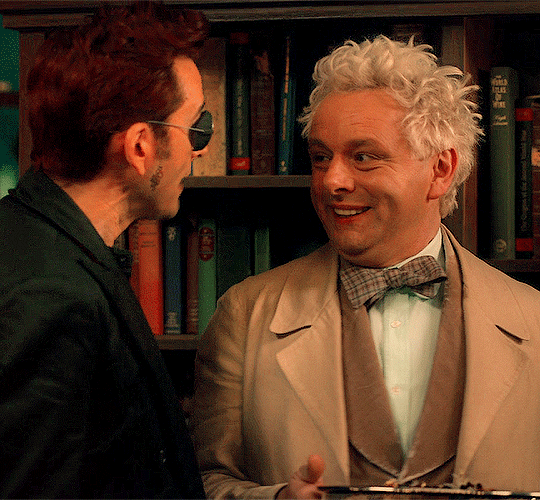
#ineffable husbands#good omens#crowley#good omens meta#aziraphale#good omens 2#aziracrow#crowley x aziraphale#good omens s2
221 notes
·
View notes
Text
Good Omens Season 3 Confirmed (trailer)
jk jk but could you imagine if any of this happened
I told myself I wouldn't go crazy working on this and then I ended up with 5 spreadsheets of dialogue trying to piece together this puzzle. Also I will need everyone to cut me some slack because I made this entire video on my phone while I was manic.
On that note, this trailer is largely based on 2 of my favorite Good Omens fics: Demonology and the Tri-Phasic Model of Trauma: An Integrative Approach by @mouseonamoose and Factory Settings by Anonymous. I love the idea of Crowley and Aziraphale having a therapist and it always reminded me of the character Dr. Linda Martin who plays the devil's therapist in the series Lucifer (Based on characters created by Neil Gaiman!) Also I tried really hard to hint at different parts of the Factory Setting story through clips, especially with clips of Crowley grabbing his glasses (which in this case would be Raphael wearing Crowley's glasses, which is a pretty big plot point in the story).
Lots of the audio clips and dialogue comes from the show itself (and a few clips from Lucifer), but I did comb through some clips of other shows that the actors were in, like Michael Sheen in Passengers, and David Tennant in Inside Man, etc. However the longer audio clips of "god" speaking are direct quotes from the Factory Setting fic (although I am almost certain that Raphael says them when he gets the Book of Life, So technically speaking, these lines are used out of context). I just ran the lines through a text to voice generator and then added a "godly/celestial" effect to it, which worked a lot better than I though it was going to. I had LOTS of potential dialogue I could have used but it didn't all fit super well together in the sense that it didn't either sound like the character speaking, or it didn't flow like a normal conversation. Believe me I tried, my phone can only do so much.
The music choice was obviously chosen on purpose, God Rest Ye Merry Gentlemen (Epic Mix) by Mark Petrie, for the purpose of pacing, I slowed it down slightly. I really liked the idea of using this song since the Factory Setting story partially revolves around "the second coming" baby and since we are nearing the Christmas season, it just seemed like sense to work on this now. The lyrics get pretty repetitive but I do wish I could have thrown in the "Fear not then, said the Angel. Let nothing you affright" verse somewhere in there.
Don't ask me to explain the actual plot of this I really just mashed two fanfics together and called it a day. I thinks that's all the notes I had.
#good omens#crowley#aziraphale#fan fiction#demonology and the tri phasic model of trauma: an integrative approach#factory settings#raphael#angel!crowley#fanfic#trailer#fanmade#aziracrow#ineffable divorce#ineffable husbands#lucifer#season 2#neil gaiman#david tennant#michael sheen#season 3#good omens season 3
212 notes
·
View notes
Text
A. Z. Fell & Co. bookshop and its statues
To start off, you have to be warned that the former set was almost completely destroyed in the S1 bookshop fire and whatever wasn’t important enough to be salvaged before the shooting had to be replaced afterwards. Which means that a few memorable and already identified pieces aren’t there anymore, for better or worse.
This is going to be another long analysis, and certainly not a full one — I’ll describe only the big picture and the most important props. A continuation focusing on the decorations in the less prominent parts of the bookshop will follow here.
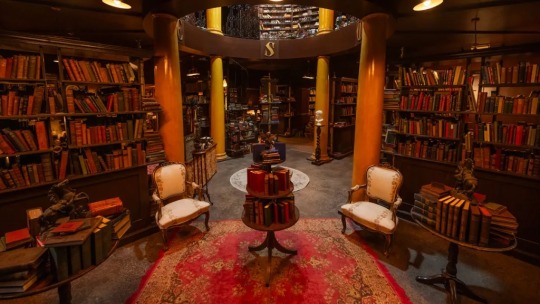
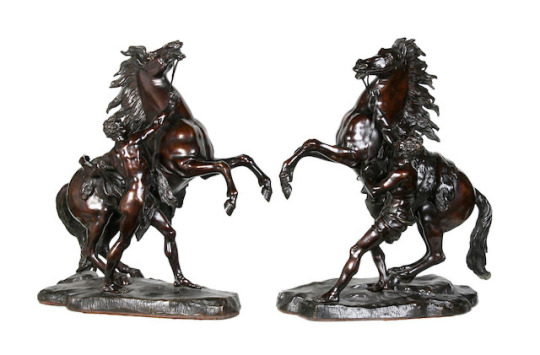
Right at the entrance we can see twin tables with the Marly Horses by Guillaume Coustou the Elder. The sculptures showing two rearing horses with their groom were originally commissioned by Louis XV of France for the entrance to château de Marly, a royal residence near Versailles.
In S2 Crowley is shown consistently using one of the horses, partially out of convenience, partially in line with a returning throughout the season dark horse theme. Ironically, the symbolic harnessing of a wild animal mirrors the supposed domestication of the demon by his angel, as seen in the transformation of the statue to the right from the entrance into an altar of his submission.
After all, there’s nothing more vulnerable to Crowley than losing the usual protection of his shades, and using a horse sculpture as a stand for his sunglasses speaks volumes about his natural aptitude towards uncertain and liminal states. He thrives in stress situations, dangles his feet while hopping onto a curb, and assumes the form of a non-Euclidean fluid when asked to sit down in a chair. Stability isn’t exactly what he’s most comfortable with. So what for Aziraphale signifies the power over his (theirs?) own domain and ultimate safe space, for Crowley means a challenge.
It makes sense that this particular spot near the exit is where the demon feels most secure in the bookshop, his favorite place in the world. That’s where he stood after crossing its threshold in 1941 too.
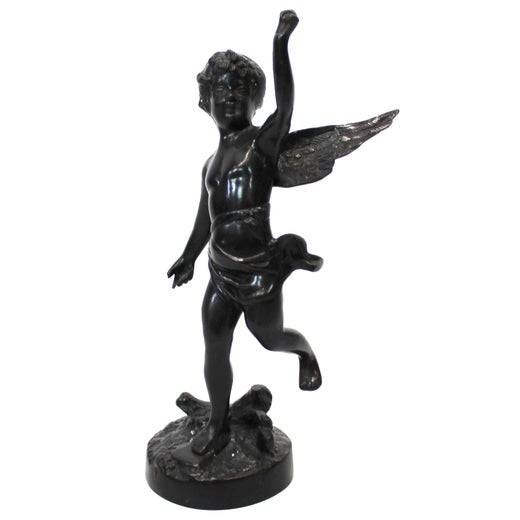
The statue in the middle, right on top of the central bookstand, was replaced after the S1 fire. It’s still clearly a Cupid, but in a different pose and without his weapons — instead of shooting an arrow, now he’s holding his left hand over his head, pointing up towards Heaven or God. Quite a change. This is the most similar copy made after Ernest Rancoulet. The butterfly-like wings (similar to the ones Rancoulet used in his La Nuit Tout Repose, At Night Everything Rests) on the copy in the bookshop have visible screws, so they were probably added either by the previous owner or the Good Omens art department.
What’s especially important from the analytic point of view is that similarly to S1, the Cupid in question still appears in the frame facing Crowley, but not targeting him anymore, like it used to, but rather mirroring. The most memorable example appears during the Final Fifteen™ when the demon points up with left hand to highlight his “No nightingales” line.
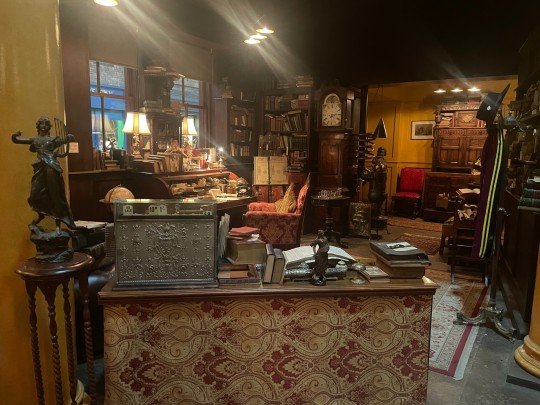
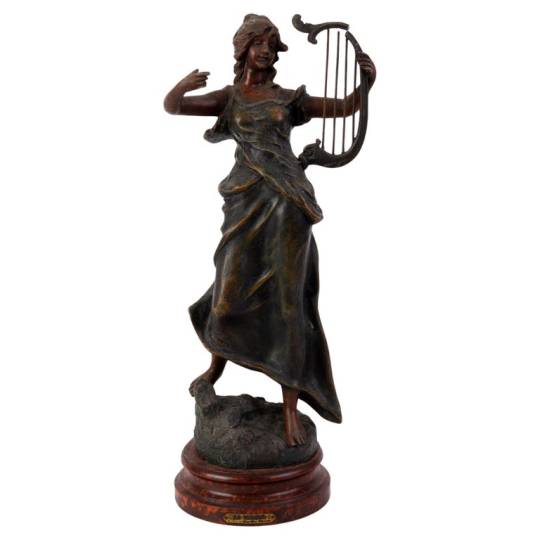
This one will be fun! Everyone, meet George Maxim’s bronze allegory of Music in her full glory. Angels like music in general, right? And Aziraphale is a known audiophile, which was asserted in the very first episode of the new season. But there’s another link to music in his angelic roots. A rather apocalyptic one — the Archangel Raphael is believed to blow the trumpet from a holy rock in Jerusalem to announce the Second Coming (the Day of Resurrection), and Israfil, its Islamic counterpart, Qiyamah (the Day of Judgment).
Staying in the very same context, let’s read the ballad Israfel by Edgar Allen Poe, which was obviously inspired by the titular Archangel.
Nothing on Earth lasts forever — but that’s exactly the reason why we should use it for inspiration, savor this momentary bliss, and hold it in our hearts. The ballad shares the same sentiment about all creation being temporary and only the passions of angels (i.e., Aziraphale’s and Crowley’s feelings) staying eternally unchanging as Aziraphale’s “Nothing lasts forever”. His line was intended as an affirmation of his feelings, similar to “You go too fast for me, Crowley”.
And just like the Cupid is mirroring Crowley in the “No nightingales” line, Music is targeting Aziraphale with her harp in the following frame.
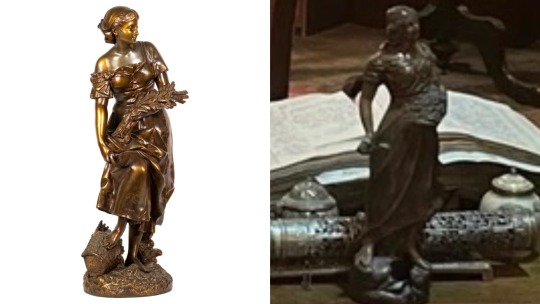
On the counter there’s a smaller bronze statue, which original unfortunately remains unidentified, but I was able to track some similar designs. A woman coming back from the harvest with crops — either a representation of Autumn or the Greek goddess Demeter bringing a blessing of a plentiful harvest. In the Bible, the harvest is a metaphor for both spiritual fruitfulness and judgment. Our productivity in God’s kingdom is supposedly tied to our faith and obedience. And the most popular verses repeat an even older saying, how one reaps what they sow:
Do not be deceived: God is not mocked, for whatever one sows, that will he also reap. For the one who sows to his own flesh will from the flesh reap corruption, but the one who sows to the Spirit will from the Spirit reap eternal life. (Galatians 6:7-8)
And another angel came out of the temple, calling with a loud voice to him who sat on the cloud, “Put in your sickle, and reap, for the hour to reap has come, for the harvest of the earth is fully ripe.” (Revelation 14:15)
The harvest is past, the summer is ended, and we are not saved. (Jeremiah 8:20)
If you read The summer that was never supposed to end meta, you’ll interpret the figure itself as a rather ominous sign. Now let’s add to it positioning right next to the gigantic Victorian cash register one cannot possibly overlook and the recurring theme of payment. And the fact that it conveniently disappears at some point in The Ball (S02E05) episode, never to be seen again. Is the payment reminder not needed anymore, because its day just came?
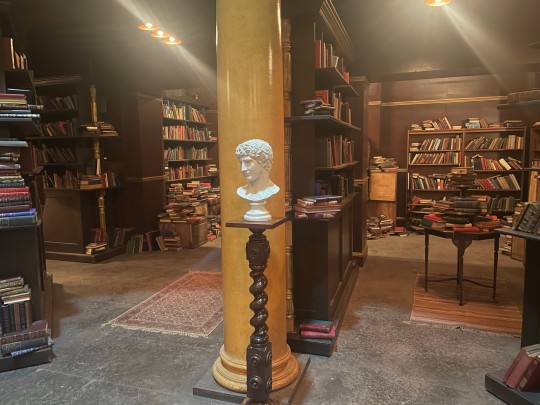
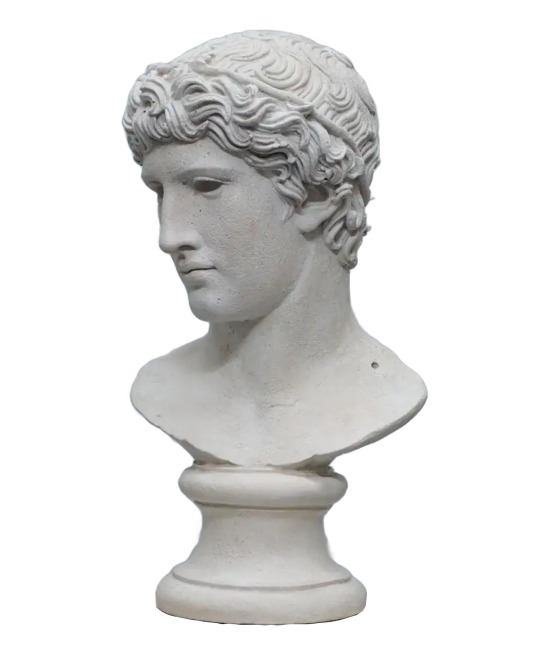
For some reason ever since S1 this one was often interpreted as a bust of Alexander the Great by the fandom. The proper name is the Head of a Victorious Athlete, also known as Benevento Head. As this suggests, the originally bronze sculpture represents a victorious athlete wearing an olive crown and was found near Benevento in Italy, in the remnants of the ancient town Herculaneum, wiped off from the face of the earth together with Pompeii in a tragic volcanic eruption (which was conveniently used later on as a more modern example of the story of Sodom and Gomorrah). It’s an obviously Roman copy of a Greek sculpture and dates back to 50 AD, less than a decade after Aziraphale and Crowley met in Rome in 41 AD— who knows, maybe they were still around at the time? This would make an interesting connection to the statue Crowley brought back to his apartment in 1941.
And no, in the HD quality and especially en face it doesn’t appear similar to Crowley. In fact, there seems to be a very good reason why most photographers choose another, more flattering angle for this particular artwork. But aesthetics aside, the white bust seems more like a mirror for Aziraphale and his self-constructed (and self-imposed) idealized image, based on a specific set of virtues. The presented athlete is victorious because he’s the epitome of the Platonic Triad of higher Forms: Truth, Beauty, and Excellence, understood in the wider context of the Greek Aretē.
To highlight this point, in S1 the head was literally used as a designated display place of the medal Aziraphale got as a commendation for his 6000 years on Earth in the 1800 cut scene. As a free agent not affiliated with Heaven in S2 he doesn’t hang it there anymore, but the medal is still in the bookshop, visible on his desk. You can see it in detail and read the description of its provenance in the last bookshop meta.
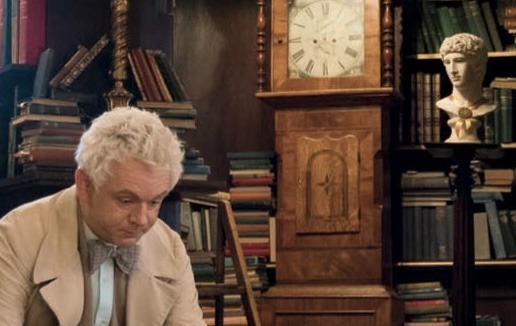
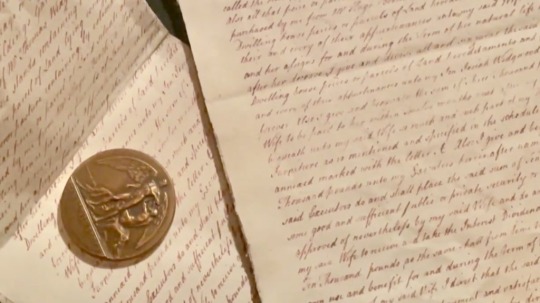
Daedalus and Icarus are a very popular motif in the history of art, but certainly not in this overtly masculine, military style. Icarus was too ambitious for his own good and ignored explicit instructions, which constitutes both the sin of pride and that of disobedience to one's parents (or one’s Creator?).
Interestingly, there’s also a version of the myth in which Icarus fashioned himself greater than Helios, the Sun himself, and the god himself punished him for it with the fall — which resonates very strongly with my vision of Crowley both in relation to his Fall and potential S3 development.
But back to Aziraphale. If the medal in question was given to him as a commendation he from the Supreme Archangel himself, it also serves as a warning for him to not get too arrogant or comfortable with his accomplishment (i.e., life on Earth) or it might lead to his fall (or, in this case, Fall).
Foreshadowing much?
#Yuri is doing her thing#good omens#good omens meta#A. Z. Fell & Co.#Aziraphale#Aziraphale’s bookshop#those art history classes weren’t a waste of time after all
324 notes
·
View notes
Text
So, as someone that has been trying to take their drivers license for months now but is too gay and stupid to do so, I believe I have the knowledge to judge if Crowley is actually a good driver or not
First off, contrary to Aziraphale whom took driving classes like the good angel he is, I solemnly believe Crowley not once in his life looked at the rule book or met with a driving instructor. After the debacle in St. James Park because of the Holy Water and taking a long ass nap, one day he woke up, saw a Bentley, desired it, bought it and winged it
For the first few years winging it was enough cause the rules weren't so strict. That's why he is so chaotic driving. He learned by doing with no formal instruction
Sure, now he is somewhat "good" cause it has been a century or so since he started faking it till he made it and, let's say, he has very good reflexes to drive around other cars and pedestrians. But ask yourselves how much of the actual "good" driving is made by the Bentley herself
We know she's sentient. She can easily drive herself. Bet Crowley has avoided being discorporated multiple times while on the wheel because the Bentley took charge without him noticing and saved his ass, especially in the early days when he was still learning the ropes. And yes, she needed to be subtle about it or Crowley would be hella offended
So, no. In my superior and knowledgeable opinion, technically Crowley isn't a good driver, the Bentley is. Crowley is good at pretending he's good
(And, yes, technically speaking Aziraphale is a better driver than he is)
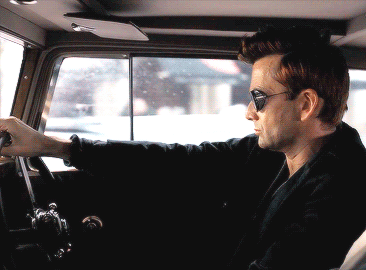
#this is not be finding an excuse to why i kin crowley and yet im shit at driving#not at all#good omens#crowley#aziraphale#ineffable husbands#aziracrow#david tennant#michael sheen#anthony j crowley#the bentley
263 notes
·
View notes
Text
Doubt is the Essence of Faith - Questions, Prayer, and Crowley’s Relationship to the Divine
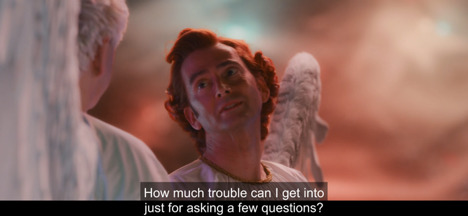
In the novel A Prayer for Owen Meany we meet a flawed pastor named Lewis Merrill who is suffering a crisis of faith. He believes that God has turned away from him due to his sinful thoughts and actions and that he is not worthy of forgiveness. As he silently wrestles with his personal demons, he preaches the most optimistic version of his belief to his congregation: doubt is the essence of faith, and not faith’s opposite.
In Good Omens, we see a similar theme play out throughout the series. While many angels and demons blindly order others or follow orders on the perceived will of the Almighty, it is those who question and who are open to questions who are ultimately closest to God. Let’s delve into the relationship between doubt and the divine, and particularly how Crowley fits into it.
God’s Presence in Good Omens
What do our characters know about God in Good Omens? For a world replete with angels, demons, heaven, hell, Satan, miracles, and nuns, there is comparatively little representation of God as experienced by the characters. (I am not counting the 4th-wall breaking narration from God in Season 1 since that is an audience-only view.) The characters of Good Omens see and hear very little from God, and the status quo is that God is distant, unreachable, unknowable - ineffible. As Crowley says, “There is just God, moving in mysterious ways and not talking to any of us.”
We only know of two instances where the characters hear from God: God speaks to Aziraphale when he leaves the Garden of Eden, and God speaks to Job at the end of his trials. The Metatron claims to be a conduit to God and to speak with Their voice: “To speak to me is to speak to God. I am the voice of the Almighty.” But the Metatron is not necessarily a reliable narrator, and even Aziraphale questions his claim by categorizing him more as a spokesperson. From an audience perspective, the more we see of the Metatron and his manipulative ways, especially when he is underscored by sinister music, the more it seems like he really speaks for himself.

Are You There, God? It's Me, Crowley
If God isn’t generally speaking to our characters, the reverse is also true. Communication is a two-way street and the characters in Good Omens rarely reach out to God. Prayer is conspicuously absent. Angels do not pray, nor do humans who come face-to-face with immortal supernatural beings. The Them, Anathema, Newt, Shadwell, Madame Tracy, the shopkeepers, Maggie, and Nina - not one of them engages in prayer when confronted with a glimpse into a world beyond their mortal sphere or even when facing Armageddon. We do not even see the Satanic nuns, a full on religious order, engaging in prayer to their dark lord and master.
While Aziraphale does not precisely engage in prayer, he does at least try to talk to God in Season 1 when he takes his concerns about Armageddon “all the way to the top.” The whole thing feels rather technical, however - more like a celestial phone call than a cry from his soul to the Almighty. When Aziraphale connects to heaven the exchange feels bureaucratic, beginning with him lodging a complaint about the conduct of Michael and the other angels. He is unable to reach God directly and at the end of the conversation, the Metatron “leaves the line open,” again more like a phone call than a prayer.

There are, however, three characters we see who engage in more traditional prayer. Job is the first character (chronologically speaking) we see speaking to God. Job is “literally God’s favorite human,” so it is unsurprising that he would commune directly. In his case it is unclear if he is actively engaging in prayer or simply receiving messages from God, but given that God starts off by saying “Job, if you have questions for me, I have questions for you,” it seems likely that Job is actively praying.
Jesus is the second character who prays. We briefly see him praying as he is nailed to the cross, entreating the heavens, “Father, please, you have to forgive them.” Again, this is unsurprising - Jesus is the son of God, has a direct relationship with Them, and is traditionally depicted as praying for the forgiveness of humanity while on the cross.
The third character who engages in prayer is… Crowley. In Season 1, Crowley turns his eyes heavenward and directly implores God not to destroy humanity: “Great Plan? God, you listening? Show me a Great Plan. Okay, I know you’re testing them, you said you were going to be testing them. You shouldn’t test them to destruction. Not to the end of the world.”

Crowley’s prayer is noteworthy when compared to what we see from Job and Jesus. For starters, it is significantly more substantial. By Crowley’s generally reticent standards it’s almost a monologue. It is also significant because instead of simply beseeching God, Crowley first questions God, then makes a demand, then suggests an alternative to what he believes God’s plan to be. Out of everyone we see speaking to God, Crowley has the most interaction and is also the one who approaches Them most like an equal.
In a second small example of prayer, Crowley says a quick “oh, God” under his breath in the confession scene after Aziraphale makes his heartbreakingly naive statement: “If I’m in charge, I can make a difference.” Here Crowley is subconsciously reaching out to God in his deepest moment of need, readying himself to try to salvage the future he sees going off the rails. He is the only main character we ever see directly reach out to God in distress.
Dangerous Questions
The characters within Good Omens share a common conviction that God is not to be challenged or questioned. In Season 1, Aziraphale is repeatedly told not to challenge God’s will via the Great Plan - after all, the war is to be won, not to be avoided. In Season 2 at the creation of the universe we see Aziraphale cautioning Crowley not to ask questions or make suggestions because it could get him into trouble. The baseline assumption is that doubting or questioning God can remove you from Their grace. Even Crowley believes that he was cast away from God because he asked too many questions. “That’s just how it started for me,” he tells Aziraphale in Job’s cellar as Aziraphale begins to question his blind loyalty to a God that would kill children. “See you in hell!”
It is also made clear that the angels and demons in charge of heaven and hell are not personally a fan of questions. In Season 2 we see the Metatron brooking no challenges from the archangels and sneering at Crowley’s history of “always asking damn fool questions.” In hell, Shax’s response to Eric’s repeated challenges and questions at the kick-off before the bookshop attack is to destroy him. Both heaven and hell are in the business of control - they give orders and expect obedience. Asking or answering questions only undermines their position of authority and control. But fallen angels, angels, and even the Metatron are not God and do not necessarily share God’s perspective.

Divine Questions
All evidence we have indicates that God actually loves questions. They sound delighted that Job has questions for Them, and They are definitely in the business of asking questions of the mortals They speak to. In fact, almost every statement we hear God make is in the form of a question. When They speak to Aziraphale, They say:
“Where is the flaming sword I gave you, Aziraphale, to guard the gate of Eden?”
And Their conversation with Job is almost entirely made up of questions:
“Do you know how I created the Earth? Where were you when I laid the foundations of the Earth, Job? Were you there when all the morning stars sang together and all the Angels shouted for joy? Do you know the rules of the Heavens? Did you set the constellations in the sky? Can you send lightening bolts and get them to report back to you? Did you give wings to peacocks, Job, or teach the ostrich to run?”

And interestingly enough, God is not the only divine entity to communicate through questions. When Satan appears at the end of Season 1, his dialogue is also almost entirely made up of questions:
“Where is my son? You? You’re my rebellious son? Come here. What? What did you say?
(As a fascinating side note, when asked a question about God in Good Omens on Tumblr, Neil Gaiman responded entirely with questions: “Does God know everything in this universe? Does God act on what God sees? Does God tolerate the behavior of her creatures?”)
In each of these examples we see that far from God being averse to questions, the act of questioning is integral to the divine. It is part of the process that God engages in when trying to make a connection. Job, as God’s favorite, is tacitly given permission to ask questions. Blind obedience is apparently not what is demanded - some measure of doubt, of questioning, is required to arrive at a sincere faith and relationship with God.
Crowley’s Relationship to the Divine
So how does Crowley fit into this? Crowley is a questioner at heart. From the beginning we see him asking hard questions. Standing on the wall of the Garden of Eden he immediately doubts the foundational actions he and Aziraphale have taken: “It’d be funny if we both got it wrong, eh? If I did the good thing and you did the bad one?” At Noah’s ark he peppers Aziraphale with questions about God’s intent, at the crucifixion he wonders what Jesus did to get everyone so upset, in King Arthur’s time he questions the value of what he and Aziraphale are doing as they cancel each other out, and on and on. Throughout this questioning he has little patience with the idea that the answers are unknowable. “Are you going to say ‘ineffable?’” he asks Aziraphale, witheringly, as he watches the Ark be loaded.
When it comes to his relationship with God, it’s clear that Crowley has many unresolved issues, particularly around the trauma of his fall and his separation from God's love. As many other people smarter than me have pointed out, his entire approach to plant care is simply a replay of his own trauma: identifying a flaw in a plant, expressing his personal disappointment in his role as houseplant God, holding it up as an example to its friends, destroying it/casting it out of its home, and threatening the remaining plants with the same fate if they don’t grow better. The bookshop fire is also experienced by him as a replay of his fall - the loss of someone he loves deeply, the fire itself, and even a physical fall when he is shot by a jet of water - that leads him to immediately get drunk and remember what it felt like to do a “million light-year freestyle dive into a pool of burning sulfur.” Crowley relives his trauma over and over.
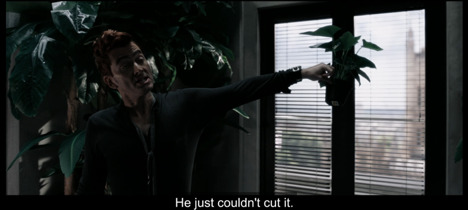
As a result of this unresolved trauma, Crowley can have difficulty acknowledging the reality of his fall and his status as a demon. Sometimes he downplays the fall itself (“I didn’t really fall, I just, you know, sauntered vaguely downwards”) as well as his responsibility for it (“I just hung around the wrong people;” “All I ever did was ask questions”). From our first introduction to him he does not behave as other demons do, responding to a ritualistic demonic greeting of “All hail Satan” with an unenthusiastic, “Uh, hi, guys.” He deliberately distances himself from hell by describing himself as “going along with hell as far as he can.” And perhaps most significantly he sets himself apart from other demons with his love for the earth, its creatures, its people, and all the lovely, clever things they invent.
Just as Crowley has never fully embraced and integrated his transformation into a demon, he has also never fully abandoned his subconscious associations as a former angel. When we first meet him as an angel in heaven at the start of Season 2, we learn that he is architecting the universe by creating nebulas, stars, and proto-planets and see the pride and love he holds for his creations. When things get tough on Earth and Armageddon approaches, his immediate thought is to return to the vast reaches of space to see Alpha Centauri or one of the nebulae he helped build, the last place where he felt a part of creation rather than of destruction. Similarly, when Aziraphale forces Crowley into action at the airbase in Season 1, Crowley’s primal instinct is to stop time and transport himself, Aziraphale, and Adam to a place that looks remarkably like the featureless white of heaven. In a callback to his previous life as an angel, he then uses the crank from the Bentley to restart time the same way he used a crank to start the engine of the star factory (perhaps even the same crank). He is even still sensitive to blasphemy, chiding Aziraphale for saying “oh my God!” and is clearly awed by and envious of the sight of Job speaking with God. “Just to be able to ask the question,” he says, wistfully.
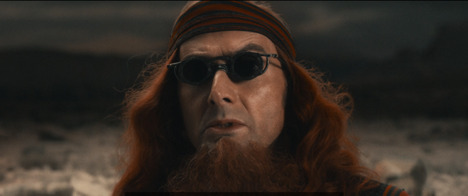
All of these interactions indicate that Crowley is not at peace with his current station, continuing to straddle a space in between angel and demon while wrestling with his past trauma. While there are times that Crowley leans hard into being a demon, he has many unresolved issues and doubts regarding his past life as an angel, the reality and meaning of his fall, and exactly what kind of demon he is now.
The Divinity of Doubt
So where does all this lead us as we enter Season 3? Crowley’s willingness to engage in direct prayer shows he is still subconsciously close to God. More than that, his propensity to constantly ask questions mirrors God’s behavior even more than God’s special favorites, Job and Jesus. Rather than being distanced from God by a tendency to ask questions, the available evidence points to questioning as being integral to a divine connection.
If anyone is to make a direct connection with God in Season 3, I predict it will be Crowley. His doubting, questioning nature is likely to be critical to the healing of his past trauma and the completion of his character arc. I would not be surprised to see Crowley get the opportunity “just to be able to ask the question” of God even if no direct answers are forthcoming. If doubt is the essence of faith, Crowley is well situated to to recover his - whatever that looks like for him - through the course of the final season.
#good omens#crowley#good omens 2#good omens meta#gomens#essay#long reads#good omens season 2#good omens s2
161 notes
·
View notes
Text

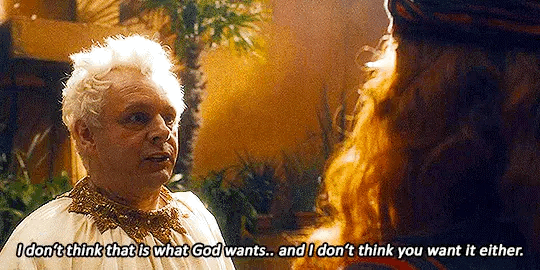
Gif credit: @dancingcrowley
I think by now we can agree that the Job minisode and Crawley’s Bildad(dy) the Shuite is a crucial time for not only Crowley’s personal journey, but between him and Aziraphale. And at the risk of redundancy, I have to break this scene down because I think it’s critical to understanding them as a group of the two of them, as well as the fact that I think it’s a complete turning point in their relationship.
Aziraphale shows up, and seemingly gives a last ditch effort to thwart Crawley’s plan to destroy Job’s children. Crawley begins sowing seeds of doubt in Aziraphale, though I don’t believe he’s doing this to be cruel. This is the beginning of the “I go along as far as I can” mindset. Aziraphale states he gets to do what God wants, and Crawly counters it with “Like killing innocent children and winning a bet with Satan?”. Seed of doubt. Aziraphale at this point looks up towards heaven as though they’ll be overheard, and says he doesn’t believe that is what God wants. Now, this is where we can leave things up to guesswork because we don’t know what God ultimately wants. That’s not what’s important here. What’s important is that we’re establishing trust and faith, which I will get into momentarily.
Next, we get the very intimate back and forth where they’re almost nose to nose. Aziraphale asserting he doesn’t believe killing Job’s children is what Crawley really wants, and that he knows him. Aziraphale demands Crawley to tell him that he wants to do it (kill Job’s children) and Crawley removes his glasses. Let’s pause here. Crawley removed. his. glasses. At this point in history, he’s using them to cover his snake eyes. Of course Aziraphale already knows what his eyes look like, but to remove them here in this moment is a show of vulnerability. Typically we see him remove his glasses to be intimidating, but I don’t believe that’s what’s going on here. Especially to do so in such close quarters is just delicious to me.
Crawley: I want to. I long to destroy the blameless children of blameless Job just as I destroyed his blameless goats.
One of Crawley’s favorite things to say is “I’m a demon, I lied.” So what makes the statement above so powerful is that he didn’t lie. He told Aziraphale the truth. He wants to kill Job’s children just as much as he wanted to kill the goats. Which we will soon learn was not at all. He’s stealthily saying “I don’t want to kill his children just as I didn’t want to kill the goats”. Why didn’t he just lie?? He made a choice here to speak his truth (albeit in a covert way) when it would’ve been much more simple to lie to Aziraphale. But he didn’t want to.
Aziraphale, thinking he’s a killer of kids (both human and goat) responds with “May God forgive you” and begins to leave. Crawley could’ve left the conversation here and continued on with whatever plan he had to not actually kill the children. But Crawley doesn’t want God’s forgiveness. He wants Aziraphale’s.
Those crows did not start making goat noises on their own. Crawley did that. He needed Aziraphale to know that he’s not a monster. He, a demon, cares what an Angel thinks of him. This was such a gamble. I don’t think at this point they had a lot of history together to establish a semblance of trust and faith in one another. So Crawley showing his hand and revealing that he didn’t actually kill the goats is huge. This could’ve easily led to his destruction if Aziraphale told anyone the truth. But he put his faith in someone else (probably for the first time since he fell from Heaven) and who was there to catch him this time? His Angel.
I yield my time.
#bildad the shuhite#bildaddy#good omens#good omens 2#aziraphale#crowley#aziraphale x crowley#aziracrow#aziraphale good omens#go2#crowley good omens#azirafell#ineffable idiots#ineffable husbands
377 notes
·
View notes
Text
Okay, here me out, i can't stop thinking about demons and the fact that many of them can't spell
Crowley says that spelling is not their strong point, and we see this exemplified especially in Shax and Furfur, but now recently it occurred to me to look up how to pronounce food in Italian. Remember Hastur? If you look it up, you'll notice it's cibo, and if you listen to the pronunciation, you'll notice it's VERY similar to the pronunciation of ciao (what Crowley says in that scene, remember?).
Learning this is what gives me a start for what I had been thinking for quite some time, because at the beginning I thought that the spelling thing was something for only the lower level demons, after all, Shax and Furfur have leveled up, but initially they were at the bottom. But not Hastur, Hastur is a duke of hell.
And the confusion between cibo and ciao proves that he must likewise have some kind of problem with language comprehension.
Also, I want to add, I'm not entirely sure if this is a good point, because I may be influenced by the fact that I'm not a native speaker, but Dagon's motivational speech doesn't directly reflect poor language use, but I get a sense that it doesn't reflect great command of it either
And then we go to Crowley, I assume we all think at first glance that Crowley has no problem with language, right? But let me remind you of something: Crowley hates books.
Yes, he has books. But the one book we see, has pictures, lots of pictures. An illustrated astronomy book. In addition to this, Crowley demonstrates a strong dislike of books. Contempt. Hatred. Yes, we've seen him write things. Yes, they are well written. But it doesn't seem to be something he enjoys
With all of this information, I'm going to reach the conclusion that ALL demons have a problem with language, especially written language. Even despite the fact that they are able to speak every existing language.
And I feel that this is a curious detail, because taking into account the powers they have, one would think that they could compensate those difficulties by miracles, right?
They don't. They still have those errors, and you could say it's because none of them have thought of it but... Really? None of them have thought of it? In 6000 years? I don't believe it.
So it must be something intrinsic, there's something they can't change that makes it difficult for them to write/spell.
And we could even go further, because one of the things I find curious, is the fact that Shax has problems with sarcasm. A demon, problems with sarcasm. No one in 6000 years spoke sarcastically to Shax?
I don't have enough arguments to add this as a collective demon problem, since Shax is (I think) the only one we've seen with that problem, but it's something close enough to mention.
Mixing all this up, I should mention the big elephant in the room: Demons have written records of who enters hell
We've already established that the difficulties with language go as far as the dukes, and I feel it's not jumping too far if we say that Beelzebub and Satan possibly shouldn't be spared.
So, who are these reports for? It's not like they're going to read them, I know that's hell, but why would they force themselves to go through that torture?
The only thing that makes sense is that those reports are for someone external, and there are only two options: heaven, or directly God.
And both options seem pretty cruel to me, because we know one thing: angels can read.
Aziraphale can, Muriel can, Gabriel can, we don't have any example of an angel who can't read. Crowley had a book before he fell. So we can assume that demons could read.
They could, and the fact that now they can't makes me see only one possible explanation: Falling caused them those problems.
And I feel that if we mix my two conclusions, the ending is something very ugly. Demons have problems with language, especially written language. Those problems started when they were expelled from heaven. They make written records that are possibly presented to those who turned them into demons.
Basically it is a very strong level of cruelty.
Please recognize the demon's rights. They still deserve to have rights
#And let's not forget to mention that giant text Crowley had on the authorization to destroy Job's stuff#Was anyone in hell even able to read that?#jay and the really long posts#good omens meta#good omens analysis#good omens#good omens 2#good omens show#good omens s2#anthony j crowley#crowley#good omens demons#beelzebub#good omens furfur
148 notes
·
View notes
Text
A Purely Selfish Action
I've had the show running in the background while I've been working and this line tripped across my ear and made me realise this is how/why Aziraphale is going to save the world.
He knows the Second Coming is on its way and this time he's front and centre for the ride. The last time it was Armageddon (Antichrist Edition), Crowley appealed to Aziraphale's love of human things to get him on side: food, music, shows, nice wine.
Yes, Aziraphale has other reasons for standing his ground as well, but when it comes down to it, he is selfish. He wants to keep his things and his people safe and comfortable. He likes to be around his people and his things and being promoted to manage the Second Coming has cut him off from all of it. From his bookshop. From his books. From his little part of Soho. From his coffee shops and restaurants and the Ritz. And, most importantly, from Crowley.
There's a lot of mess surrounding their final interaction, both of them speaking at cross-purposes and actively not understanding why the other is doing what they are doing, but there can be no mistake that there is the love there. And I have absolutely zero doubts that the Metatron used Crowley as leverage against Aziraphale in ways we didn't see - there's a reason we were only shown parts of that conversation.
In Aziraphale's mind, if they're on the same side, then Crowley is safe. He's thought that since S1. "Heaven will win, of course". "You were an angel once". When Crowley rejects that, it is precisely a rejection of that - Heaven and angeldom and stepping back into that rut. Crowley makes it crystal clear that he would be happy with just Aziraphale. The love is there, from both sides. Instead of one saying "come away with me" we got the double-whammy "come away with me".
I'm absolutely certain that being stuck back in Heaven is Aziraphale's worst nightmare, especially without his emotional support demon. And the bigger the threat of Armageddon 2.0 grows, the more he realises what he will lose.
I don't doubt that any threat to Crowley will activate every Guardian instinct in that fluffy angel's head. Aziraphale has spent many a happy time letting Crowley rescue him from dangerous situations, but if anyone - anyone - threatens harm to his demon, Aziraphale Will Not Care For It.
I am so here for the territorial fierce Guardian of the Eastern Gate who puts his foot down and says "No, actually, this is my world, that is my city, that is my demon, and you are not destroying them, thank you very much. If you want to get to them you have to go through me and thank you very much for giving me all the powers of the highest of Archangels :)"
295 notes
·
View notes
Text
Wake up, Good Omens fandom! We're doing something special!
Ineffable May 10
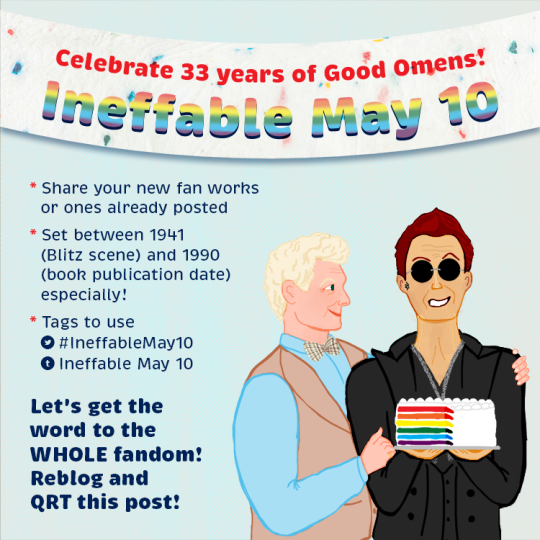
May 10 is both what is often cited as the date the book published (in 1990) and it's the day St Dunstan in the East Church (Neil's inspiration for the scene) would've matched up with the episode 3 Blitz scene (1941).
Bring on your fan works set between '41 and '90!
New or already shared fan works alike, they cover nearly 50 years of Crowley and Aziraphale knowing the other would absolutely, without a doubt save them. That's 50 years of "you can't deny this feeling".
40s, 50s, 60s, 70s, and 80s. There's so much you can do with those eras, for Aziraphale and Crowley, other angels and demons, and even many of the humans! Especially in bookverse.
Or do something AU and toss canon to the wind!
(I personally love that 1967, another Hard Times cold open scene year, is when London decided to turn the remains of the Blitz scene church INTO A GARDEN. Crowley definitely had something to do with that.)
You can use the tag for any Good Omens celebrations you have on May 10 but especially for showing those fan works set between 1941 (the Blitz scene!) and 1990 (when the book came out!)
AND HEY!
ANY HELP getting the word out is super. I am but a small fan with an even smaller reach. I want anyone who wants to participate to have a chance to hear about it! Thanks SO SO MUCH!
And speaking of thanks: THANK YOU @flantasticclaude for your enthusiasm for this sudden fandom event, and stepping in to make the above wonderful, rainbow-filled graphic to get the word out.🌈😇😈
Let's all have an amazing fandom celebration on May 10!
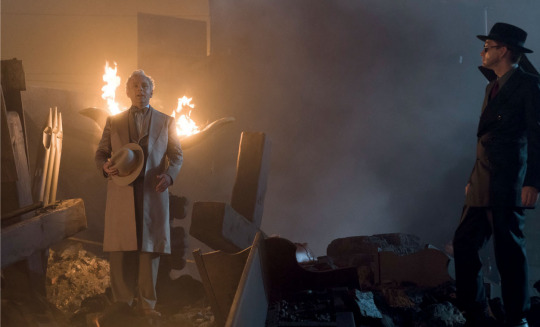
#Ineffable May 10#good omens#good omens 2#may 10#crowley#aziraphale#good omens series 2#good omens art#good omens fanfic
570 notes
·
View notes